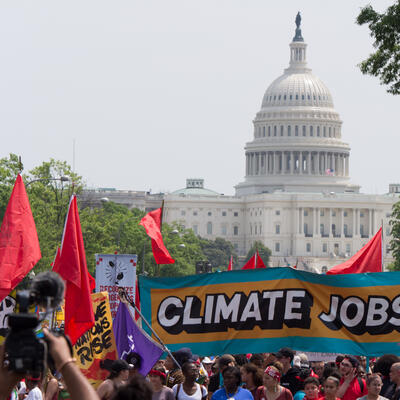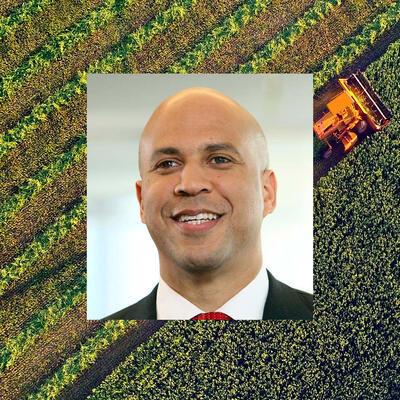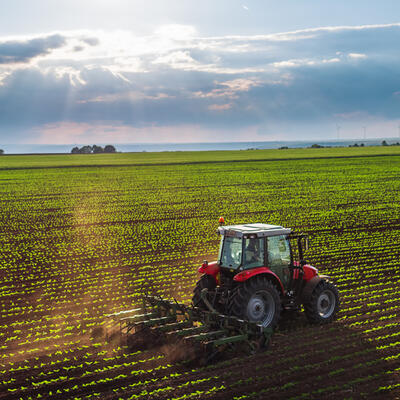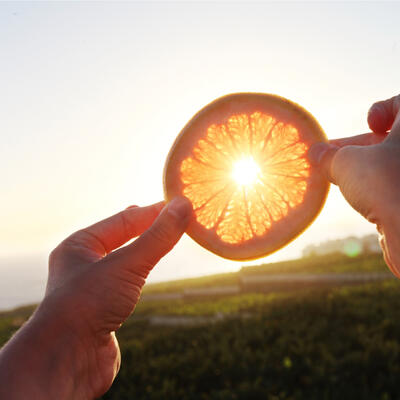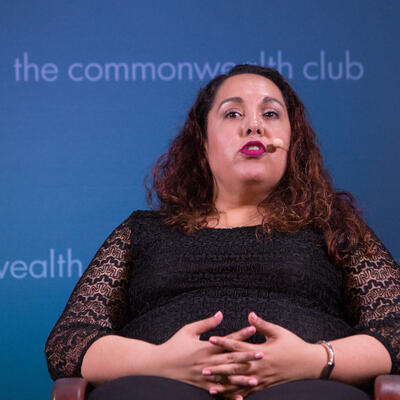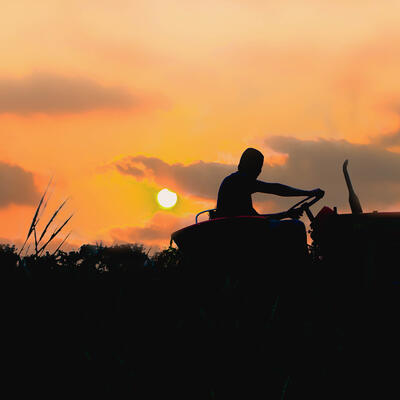
Cropped Out: Land, Race and Climate
Guests
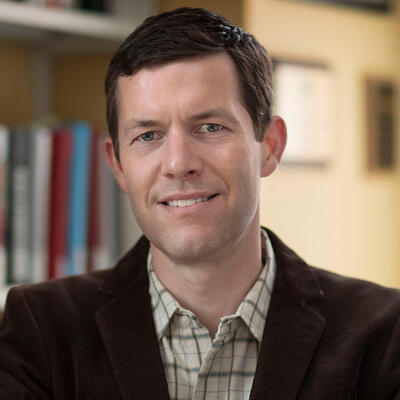
Andrew Kahrl
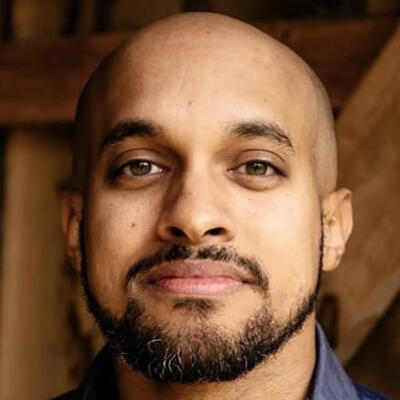
Chris Newman
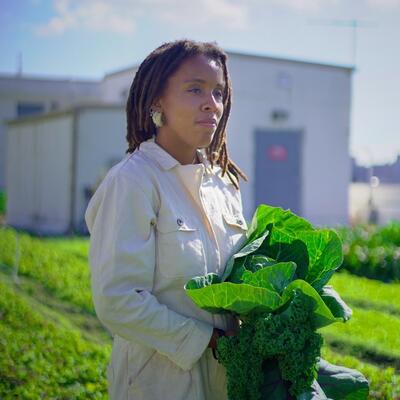
Amber Tamm
Summary
African-American farmers have been no strangers to land dispossession in the face of capitalism, based on extracting minerals and other resources out of the ground, and labor out of people.
“At the same time that developers are working to steal black folks land, they are both contributing to racial inequality and contributing to environmental instability,” notes Andrew Kahrl, author of This Land Was Ours: African American Beaches from Jim Crow to the Sunbelt South.
Kahrl teaches history and African-American Studies at the University of Virginia, where he studies how Black landowners have lost approximately 11 million acres of land to fraud, deceit, and outright theft. Ironically, many of those properties are now threatened by sea-level rise and coastal erosion.
“By looking at coastlines,” he says, “you really begin to see how the struggle for racial justice and for environmental sustainability are fundamentally linked.”
Black farmers work at the intersection of these challenges, as structural racism in the food system makes it increasingly difficult for non-white farmers to own and profit from land.
“The food system is not based on feeding each other,” says Chris Newman, co-founder of Sylvanaqua Farms in Virginia, “it is based on producing a product that transports well, that doesn't spoil, that can be turned into things other than food.”
The son of a Black mother and Native American father, Newman is on a mission to bring indigenous knowledge -- and people of color -- back to the practice of growing food.
“All of our foodways are based on occupying land and taking,” he says, “we don't have an indigenous mindset of relating to the natural world as family, of relating to one another as family.”
Farmer and horticulturist Amber Tamm shares a similar vision. As a Black New Yorker descended of Cherokee slaves, Tamm’s project to renew Seneca Village in Central Park connects personal trauma and climate grief with her agricultural work.
“Everything that's going on pertaining to food and soil I feel it in my own body into my own experiences,” she says, “because what is done to the earth has been done to me.”
Related links:
Sylvanaqua Farms
The Story of Seneca Village
This Land Was Ours: African American Beaches from Jim Crow to the Sunbelt South
Full Transcript
Greg Dalton: This is Climate One. I’m Greg Dalton. Black farmers have been no strangers to land dispossession in the face of capitalism, based on extracting minerals and other resources out of the ground, and labor out of people.
Andrew Kahrl: At the same time that developers are working to steal black folks land, they are both contributing to racial inequality and contributing to environmental instability.
Greg Dalton: However, Black and Indigenous people were also stewards of the land for centuries.
Chris Newman: This may be the end of extractive settler capitalism. This may be the end of a basically 5 to 600-year-old worldview that you can just take, take, take and never give back.
Amber Tamm: Everything that's going on pertaining to food and soil I feel it in my own body into my own experiences. Because what is done to the earth has been done to me.
Greg Dalton: Cropped Out: Land, Race and Climate. Up next on Climate One.
---
Greg Dalton: How have race and (in)justice shaped the American farming landscape? Climate One conversations feature all aspects of the climate emergency, the individual and the systemic, the exciting and the scary. I’m Greg Dalton.
Greg Dalton: African Americans have lost around 11 million acres of land to fraud, deceit, and outright theft. Now many of those properties are threatened by sea-level rise and coastal erosion.
Andrew Kahrl: By looking at coastlines you really begin to see how the struggle for racial justice and for environmental sustainability are fundamentally linked.
Greg Dalton: That’s Andrew Kahrl, Professor of History and African-American studies at the University of Virginia, and author of The Land Was Ours: How Black Beaches Became White Wealth In The Coastal South. He’ll join us later on today’s show. First, separating farming from bigger forces in our industrial economy.
Chris Newman: The food system is not based on feeding each other. It is based on producing a product that transports well, that doesn't spoil, that can be turned into things other than food.
Greg Dalton: Chris Newman is co-founder of Sylvanaqua Farms in Virginia. The son of a Black mother and Native American father, Newman is on a mission to bring indigenous knowledge -- and people of color -- back to the practice of growing food.
Amber Tamm: I'm pretty much like a young black woman experiment for agriculture to see how far you can go.
Greg Dalton: Amber Tamm is a farmer and horticulturist based in New York City. Her path toward working with soil began with losing her mother and father at the age of eighteen.
Amber Tamm: So I was in College of the Atlantic for maybe 4 to 6 months after graduating high school. And that was the first time I left New York City also the first time I left my parents. And then I got a phone call that my father had murdered my mom. And from that point forward, I mean I had two younger siblings that needed to be tended to and a funeral to plan and a bunch of things regarding like property and taxes. And nothing that I understood because in school I was being reared to have a perfect SAT score and like go to a good college only to be met with the realities of adulthood. So, I was left needing income, shelter and food. And my only two options are working on a cruise ship or farming. And I chose farming because I already have had an affinity for soil. And I wanted to go to Peace Corps after college, but I figured now was my time. And upon arriving to my first farm that’s when my ethos developed of -- because I put my mom’s body in the earth because she returned to where she belonged. That now in working with the earth, I'm working with my mom. And not only my mom but like my mom's mom and so on and so forth.
Greg Dalton: Chris Newman, why did you leave your job as a software engineer to decide to work the land?
Chris Newman: Yeah, I was in tech and had gotten to the kind of the pinnacle of that career path and realized I hated it. I kind of got to the top of the mountain I’m like this is it? And then there was kind of a stress related almost cancer scare. I mean it was a cancer scare that was finally the kick in the butt I needed to say, okay do with your life what you want to do with your life now and don't wait to retire. And what I wanted to do initially when I retired and was a stately gentleman with a nice fortune was to start a not exactly a hobby farm, but a farm that focused on indigenous agriculture, specifically around bison, landrace varieties of corn, all varieties of corn, I happen to just know a lot of seed keepers. So that had been the plan and because of stress and the health consequences thereof we accelerated our farming plans by 40-ish years or so.
Greg Dalton: And how did your family lineage shape your journey?
Chris Newman: Ironically enough, my family lineage pushed me hard away from farming. I told my hundred-year-old grandmother who, you know, on the black side of my family, my background is Choptico-Piscataway, I’m indigenous on my father side and African-American on my mother side. My mom’s side came from farmers in the Virginia Tidewater down at Suffolk Norfolk, that area. I told my grandmother I was farming she looked at me for like a whole minute. And grandma didn't really look at people like that but when she looks at you that long it’s like, oh, uh-oh. And she said, like to have kept your day job. And that’s all she ever said about it. Like it’s a big thing where in the consciousness of black people the arc of progress goes away from the farm away from the plantation away from the soil. There's a lot of trauma around that and a lot of impetus to not be involved with the soil. And the same to an extent on the indigenous side when it comes to farming as opposed to what indigenous people usually regard as protecting land and protecting water which are often at odds. Farming, the idea of having a piece of land that you regard as private property is often considered anathema to indigenous ideals about what land is and how it is to be stewarded. So my family legacy was very much like you should go back into software because we worked real hard not to be poor and look what you're doing.
Greg Dalton: Interesting. Amber, you recently visited the Kumeyaay nation near San Diego, it was your first time on a reservation. How did that conform your journey connecting with the land as a black farmer in Brooklyn?
Amber Tamm: This is such a crazy vital question because I think that experience enabled me to open myself up to dialogue with more indigenous people. I think as a black woman who is a descendent of Cherokee slaves which is not spoken about and the Cherokee nation not giving me my tribal card because they still have semi-racist politics pertaining to who is Cherokee and who’s not. I definitely have an identity crisis and close myself down to claiming any indigenous blood, but then I also had a lot of anger that bubbled up because there's a lot of unspoken tension between black and indigenous people at least here in my realm that is like New York City. And so, when I went to that reservation when I thought it was interesting that I had to go all the way to West Coast to be initiated into a reservation and be on sacred lands. But aside from that initiating, guiding me to other indigenous communities I really got to sit with white sage for the first time in a living format and that definitely changed my life. I definitely got lots of downloads from like sage and I literally sat in front of one white sage plant for many hours just communing with it.
Greg Dalton: I’d like to hear about your farms, Chris Newman describe your farm. What are you harvesting this year? Describe your ranch and farm for us.
Chris Newman: Yeah, so this year we’re doing forest-fed pork we’re doing pastured poultry, pastured eggs. But next year we’re really looking forward to just really blowing up what we’re going to be harvesting in addition to the products of regenerative agriculture we’re going to be doing a lot more indigenous foodways, focusing both on intensive indigenous agriculture so the stuff everybody's heard of Three Sisters, wild rice cultivation in this area. J-chokes, Jerusalem artichokes, acorn flower, cattail flower, cattail foods. And really focusing on those kinds of wild and semi-wild foods, making those available to communities. So that people who suffer on the food apartheid, which include indigenous communities and the African-American communities where I come from have access to nutritious food without it, you know, breaking the bank. And then on the flipside, continuing to do what we've always done for the last like seven, eight years already. More chicken, more beef, more pork, more eggs. We’re on a lot of land we don't own land where we are, we’re on about 1900 acres of a former plantation which is always wild. But, yeah, that’s where we’re at.
Greg Dalton: And when you say shared ownership are you creating some kind of collector of cooperative where people will have an ownership stake. You said you don't own the land, but are you – what’s the path to ownership?
Chris Newman: Yeah, that’s a complicated one. So, what we want to do is allow people to come in and form their own work around collectives where they farm the land and have access to two critical things. One being a land-based through a land trust and the other being a set of shared services that are kind of the business aspect of farming that tends to knock a lot of young new and especially farmers of color down. Stuff like accounting, insurance, markets, branding, publicity, compliance, regulatory. The stuff that nobody wants to do when they decide to go back to the land, especially for us, which tends to be a healing journey. It was for Amber it was for me as well. These business aspects of it where we have to interface food production, which for indigenous people has always been about kinship economics and about community and feeding people runs kind of into our present reality of capitalism and markets. And what we really want to do is soften that landing for people that are coming back to the landscape so that they can do what they need to do on the ground and have people like me who are privileged enough to go to college and have a good job and save a bunch of money and, you know, came from the kinds of families that were fortunate enough to put me in the position that I'm in. Let us kind of absorb that shell of end-stage capitalism and let everybody else do what they need to do in the ground.
Greg Dalton: Amber describe your farm in New York City.
Amber Tamm: My vision for Seneca Village is one to walk with the Seneca Nation of Iroquois and do not pay people into reclaiming that land. My vision for Central Park essentially is for Central Park to release that land to the people.
Greg Dalton: Why don’t you explain what Seneca Village was because I think people don’t really understand the story of what Central Park was before it was Central Park.
Amber Tamm: Sure. So specifically, by the great lawn right off the 85th St. in Central Park West. If you enter that part of Central Park you’ll immediately see plaques that say Seneca Village and basically on those plaques is an explanation that once upon a time a long time after Lenape and Iroquois were kicked off the land that there were black African-American folks who were very affluent, who occupied that land and owned it. And by way of owning it they were able to then give out other people opportunities to own land there because at that time you had to own land in order to vote. And so, Harlem which is where most affluent blacks live was getting way too crowded so there are some that moved down to 85th. The name Seneca Village actually comes from a priest and it was actually a derogatory term. It was in reference to the Seneca Iroquois and it was known to be a slur. And the Village part came as like oh it’s a brown wasteland for low whites. And that is verified by Central Park’s researcher that that's why it's called Seneca Village. And so, me as a native New Yorker and my family being here close to five generations in New York City, me wanting to reclaim those grounds is by way of just reclaiming it for the people. And so, my vision for that land is specifically to walk with Iroquois and Lenape people because that is their land first and figure out what they want to do at that land first and secondly is to be able to give native New Yorkers access to land that they feel comfortable in. I think a lot of people not from New York City don't know that Central Park is a realm in which if you are from the hood and you are brown you are not chilling in Central Park. It is not a de-stresser or safe place or a safe ground by any means. I went to Central Park maybe two times growing up because it wasn't a place for people like me and that's what I was told. And so, in reclaiming those grounds it’s important for those native brown New Yorkers to have a place and a say-so and a place to just be informed on how to grow food, diversify those soils, etc.
Greg Dalton: Amber, I heard you talk about some grief there when you talked about Seneca Village. You've also connected climate grief with your own personal grief what you talked about losing your parents. So, tell us about how you process climate grief because we’re talking about food production in the age of climate disruption.
Amber Tamm: Well, climate grief was an umbrella term that I use and I was finally having my epiphany of how agriculture doesn't work. I think for 2 1/2 years I was on a migrant farm trail along with other immigrants, only I'm not an immigrant, which caused a lot of confusion. I was basically in the middle of this like South American Caribbean realm, but only I was a Black-American young woman. And so, I think my intersection with agriculture is very different because I've been on the migrant trail. I've been paid like a migrant farmer. It's not an experience that is away from me. It is one that I lived in and it is horrendous. Having almost been raped, sexually assaulted not being given certain opportunities because those things can happen really was the onset of the climate grief and really understanding women in agriculture in the not safe way was the onset of climate grief. And even on regenerative farms I was having negative experiences. And I couldn’t understand how I just kept going from place to place to place to place. And along with like me being like wow, I’m healing from this trauma with my parents, but accumulating more trauma from each farm. That's like the birth of my climate grief. So I say that as an umbrella term to say everything that's going on pertaining to food and soil I feel it in my own body into my own experiences. Because what is done to the earth has been done to me it's a reflective matter. I think most women cis-identifying people can say that when they see things done to the earth, they can reference so many times that has been done to them.
---
Greg Dalton: You’re listening to a Climate One conversation about connecting personal trauma and climate grief. Coming up, more on the complicated history of food, farming, and people of color in America.
Chris Newman: I remember people getting their gardens ripped up by HUD because it wasn’t a lawn. You plant a garden you try to feed yourself no screw you they're going to rip up your freakin’ garden and turn it back to lawn because that's what the regs say and you can take your food stamps over to the gas station and buy whatever
Greg Dalton: That’s up next, when Climate One continues.
---
Greg Dalton: This is Climate One. I’m Greg Dalton, and we’re talking about race, land and climate with two farmers. Amber Tamm, a horticulturist based in New York City, and Chris Newman, co-founder of Sylvanaqua Farms in Virginia. Newman may be on a mission to reinfuse agriculture with indigenous knowledge and sustainable practices, but he’d be the first to tell you that he’s not in the business of promoting a “climate-friendly diet.”
Chris Newman: If you believe science, my people have been in the Chesapeake Bay region for somewhere between 12 to 15,000 years I’m not exactly sure. It’s not about diet. Diet has nothing to do with it. If you look around this country if you look around Turtle Island every diet you can imagine, was here. You had people that ate nothing but meat. You had people that were almost vegan and everything in between. And yet for the most part they managed to organize societies and a way of relating to the natural world that did not extract from those places. Diet has nothing to do with it. People love to think of climate diet because it's an easy thing that you can do to fix the problem right now. Nobody really wants to do the hard work of realizing that this country was founded and really all of the dominant political systems and power systems in this entire hemisphere are based on extracting from this place and it's never stopped. Only 34% of the calories that are produced in this country actually go into any food system. The rest of it go into biofuels they’re going to bio plastics. The food system is not based on feeding each other it is based on producing a product that transports well that doesn't spoil that can be turned into things other than food. So, yeah, the idea that if you eat less meat if you start eating Beyond Burger instead of the beef burger at Burger King. If you go vegan or if you only eat grass fed meat. What we really need to do is people like me, you know, I'm not rich but compared to a lot of people I have an awful lot of privilege as somebody who has access to the amount of land I do to the expertise I do to the network of people that I do. It's really up to us to show consumers which is again how we like boil down people's existence to, right, to show them what is possible. That there can be a different kind of not diet, but a way of producing food of relating to the natural world of understanding our place in nature beside nature, not separate and apart and above it. And I think until we have that kind of revolution of the mind, consumerism is not going to solve this problem because consumerism is what got us here.
Greg Dalton: Amber Tamm, I saw that you posted on social media something from Sustainable Brooklyn that said, “It’s not enough just to change the system we need to change ourselves.” I’m interested in your thoughts on that because what Climate One tries to do about changing systems by changing ourselves.
Amber Tamm: Yeah. I mean that in the sense of when I’m on Instagram I'm really talking specifically to black people from the hood because those are people who follow me. And so that is a touching component for them to say the change that needs to happen within themselves is one where they need to work on freeing up their mind to really return to a rural lifestyle. One that is all-encompassing of who we are, who we are as a people culturally and that's usually the turn off. Because within the realm of agriculture I feel that we are not talking about the cultural components. I feel like we’re spending a lot of time talking about the physical components and I recognize understanding how to run a business and the physicality of it. But when it comes down to soil like I’ve said on Instagram a million times talking about soil does not mean anything unless we’re also going to talk about land access. And that will forever be my truth so yes, I do think that there is an internal change that does need to be made. But what I know is once your hands are in the soil and once you’re communing with mama earth and the ancestors and whatever soil that you’re touching, those changes will start to generate.
Greg Dalton: A lot of people are doing that with their COVID gardens. There’s been a boom in home gardening this year while people are stuck at home. Chris Newman do you see any prospect in that the people kind of is that a small step toward people getting their hands back on the earth the soil?
Chris Newman: Yes and no. There's a part of me that loves the idea of like the victory garden concept and kind of restoring a certain sense of food sovereignty. But there is a part of me that doesn't like the idea that we think we might feed ourselves by everybody growing lettuce on their balcony or whatever. I think it’s one thing to kind of establish that connection to people that people realize that yeah food doesn't grow in the grocery store and that it does come from the ground and that it doesn't come wrapped in plastic and with rubber bands around it with branding on it. But it’s such a complicated thing, right? Because how many stories, you know, Amber has probably heard of this, people that have grown up in the projects and I grew up not in the projects but next to the projects and I remember people getting their gardens ripped up by HUD because it wasn’t a lawn. You plan a garden you try to feed yourself now screw you they're going to rip up your freedom garden and turn it back to lawn because that's what the reg say and you can take your food stamps over to the gas station and buy whatever and continue with your freaking, I don’t know chronic diabetes and everything else. That’s what the state does. I mean look I think with COVID what isn’t so much hopeful to me is kind of the gardening trend and people buying their own chickens, which made it real hard for me by the way to source my own chicks when it came time, thanks everybody. But people understanding how fragile and in some ways ridiculous our food system is, you know, everybody probably remembers how there was no meat on the shells for months when COVID hit and when everybody freaked out and when the restaurants shut down and we realize we had a supply chain that was so tight and that was so modeled after industrial manufacturing that there was no resilience in that system at all. You had meat lines it’s crazy in the richest country in the world by far you had people wonder what the heck are we gonna eat. I had people panic buying on my website. And this is going to happen again. COVID-19 is probably not the last pandemic we’re gonna see in the short term. We've heard from Fauci and from others in the CDC that this could just be the beginning of a wave of pandemics that we are dealing with for the foreseeable future. To mention nothing of you know, increasing droughts, increasing fire, increasing flood, increasing everything that makes it harder to do agriculture and feed people the way that we traditionally have. So, I think COVID has been kind of like our little test of what could come and how money can't save us and we can't eat it. We really have to reimagine what food is how we feed each other and why.
Greg Dalton: And a lot of people have taken the COVID example to critique of supply chains at the industrial model and said, small local organic. But Chris you actually say that big isn't always bad, why?
Chris Newman: Yeah, it’s really easy to beat up on the bigness of agriculture. And that’s not to say that JBS and Cargill and Tyson and all of them like deserve a pass. They do terrible, terrible things to people. But I would argue that the largeness of agriculture the scale at which it operates like the watershed level that it operates at is probably the most indigenous thing about it. The whole idea of homesteading was that the United States had all this land west of the Mississippi that it absolutely wants to conquer and occupy and they knew there was a lot of wild stuff out there and it was too big to invade with an army. So what do you do? You take your white immigrant population and you say hey look, you go out there and you deal with the wolves and the Comanche and the Sioux and like all these dangerous things that aren’t gonna exactly appreciate you traipsing on their territory and busting sod and, you know, screwing up their ecosystems. Y'all deal with that. And that whole idea that you’d get your 160 acres like that’s where the idea of homesteading comes from. It is an idea that is literally born of the violence and dispossession that got us where we are in the first place. Native people manage things as a common at scale. The Piscataway manage farmland that ranged all the way from present-day Washington DC all the way down to where I am here. It was a huge agricultural system, a gigantic agroforestry system that was so big that people like John Smith or Henry Fleet and other people that saw it firsthand did not realize that they were standing in a food forest. They thought they were standing in the garden of Eden and had no idea that this thing was absolutely anthropogenic. So, bigness is not necessarily bad, it's your motivation for your size. Why are you big? Big agribusiness is big because their margins are so small that in order to reward their shareholders in a way that they won't revolt they have to tear down the whole Amazon they have to create cattle that can hold like 18,000 head of cattle like they have to be big to extract profit from the landscape in order to make investors who have no hand in the landscaped soil or the communities they’re supposedly feeding at all. Whereas if you're like our farm and our operation we want to be big because we want to restore the whole Chesapeake Bay. We want to restore the whole Potomac River the whole Rappahannock River. And we can't do that from a 40-acre homestead as pretty and romantic as it might be. So, you know, bigness is about your motivation it’s always about your why it's never about the what.
Greg Dalton: If you're just joining us, my guests today are Chris Newman, farmer and cofounder of Sylvanaqua Farms in Virginia and Amber Tamm, farmer and horticulturist based in New York City. Amber, what’s your vision for bringing food and farms closest to the people who need it the most for changing the food system in a hot and crowded world. How do we bring it closest to people who need it most?
Amber Tamm: My vision is for food to be free. I think me being the third or fourth generation within Brooklyn to not know how to grow food to be on food stamps and be told what you can buy and what you can afford and to not be connected to food. I mean, for the longest time as a child I never knew that a chicken that was walking was it like the chicken cutlet inside of the Styrofoam like the disconnect for me was so huge until I entered a realm of diversity of white folks in elementary schools. So I think being able to give low income people, especially low income brown people autonomy to try things to figure out what they like and what they don't like, rather than us to resorting to the bacon egg and cheese from the corner store because that's all we know is two very different conversations. I also think that people deserve time to understand if they want to grow their own food and I emphasize this because there is this ideal that farming is so cool and it’s so fun and it’s so healing when in reality and I've been trying to do more awareness about this, but production farming is really, really intense and it is not calming or therapeutic. And like Chris is just saying it is very extractive and I'm coming out of five months of only being harvest crew where I'm just constantly extracting and not ever being able to give and that's a very, very exhausting process. So, I do think that low income people deserve to see if growing food as a career is something they want to do for as long as money is relevant or if it's something they just want to do for their family or if it’s something they don't want to do at all. And as Chris mentioned earlier, there is realms that I've been extending to people from my own branding where I need help, which is exactly what he said accounting which is social media management all these things where others can play a role for the sake of regenerative BIPOC agriculture. So, I think it's much bigger than just being in the dirt and being dirty. There are other ways that people can join in but those other ways have to be shown. I’m just here to facilitate those roles out as I'm learning. I'm pretty much like a young black woman experiment for agriculture to see how far you can go.
Greg Dalton: And as you look at what we know about climate disruption and Chris mentioned the heat and the droughts, etc. How does climate affect that outlook for you?
Amber Tamm: When I got my farmer certification in Hawaii and one of the first things that every farmer out there told me they were like you need to learn how to surf. And I always be like, I don't understand like the connection between me farming and me surfing. And they’d be like, oh because like climate change is real, like there's going to be one big wave that we’re all gonna ride until our death. Like that’s like indigenous Hawaiian thought where there is no fear. They’re like that's the one big wave that we will ride to our death. And then my good brother _____ [00:49:28] he always says, and he’s from the Sioux nation, but he always says you are to become one with whatever's happening that you don't see you know weather report as something against you but you are to become it. So, when you see the tornado you are to become the tornado. It is not something that is outside of you or here to harm. It is you. And so those are the lines that I think habitually, all brown people think naturally, but I think I can only talk for black community and say that I, for sure can tell you that the fear is more about the cops that are literally outside my window right now more than it is about the tornado coming.
Chris Newman: I think there's also the fact that just for people of colors, especially for black people, especially for indigenous people this is not our first glimpse at the end of the world. Our world ended when our first visitors showed up on this side of the Atlantic. Our world ended when people, you know, slave trader showed up in Africa and took us from our homelands and snatched us off the ground and we are braiding seeds out here just thinking dear god what comes next. It ended again when we got plopped down here on these shores I mean the plantation that our farm at now the history was that people were bought straight from Africa put in the pen in front of the great oval in front of the great house, and their first task was to build the damn mansion. You know, that’s the end of the world for them. It was the end of the world when the Homestead Acts were passed and people came en masse across the Mississippi river. And the thing is for people who are not people of color for white people like this might feel like the end because I think this may be one of the first ends that they've ever really had to deal with. This may be the end of extractive settler capitalism. This may be the end of a basically 5 to 600-year-old worldview that you can just take, take, take, take, take and never give back. But for us, each of these ends has been a new beginning. And they haven’t been pleasant. But on the other side there's always hope. Amber and I aren't supposed to be here doing this. We’re just not. We are the seeds that our grandparents planted. You know it’s the thing that Rowen White says, you know, “they tried to bury us but they did not realize we were seeds.” It’s okay, we’re being buried right now. And if we’re fortunate and if we’re smart, and if we can apply the ingenuity that we've always applied, well not always but, you know, since our roommates showed up apply that ingenuity and drive toward solving problems. Toward reciprocity towards indigenizing this landscape and getting away from what got us here there's nothing but hope on the other end of this tunnel, even though it will be as painful as childbirth.
---
Greg Dalton: Chris Newman is a farmer and co-founder of Sylvanaqua Farms in Virginia, and Amber Tamm is a farmer and horticulturist based in New York City. This is Climate One. Coming up, how approximately 11 million acres of land have been held by -- and taken from -- Black Americans.
Andrew Kahrl: This is almost a classic example of the forces that have been arrayed against African-Americans who have strived toward opportunity within our economy in America who then find themselves singled out for the type of racist abuse and discrimination.
Greg Dalton: That’s up next, when Climate One continues.
---
Greg Dalton: This is Climate One. I’m Greg Dalton. June and Angela Provost are sugarcane farmers in Western Louisiana. Their story is emblematic of how systemic racism has prevented Blacks from accumulating land and wealth, a problem that is compounded by climate disruption. Freelance producer (TKTK) Julianna Bradley filed this report.
June Provost setup piece - [3:13]
Greg Dalton: That was freelance producer Julianna Bradley. Andrew Kahrl is professor of history and African-American studies at the University of Virginia, and author of The Land Was Ours: How Black Beaches Became White Wealth in the Coastal South. I asked him how representative the story of Jim Provost is in the context of what he studies.
Andrew Kahrl: It’s very representative in the sense that here you have a family who is being singled out for racial discrimination by other farmers, as well as by federal government down through lenders and banks. I mean this is almost a classic example of the forces that have been arrayed against African-Americans who have strived toward opportunity within our economy in America that it is often those who do work to advance their own position and do so often by playing by the rules that were set out by those in power who then find themselves singled out for the type of racist abuse and discrimination. And certainly in particular with the plight of black farmers that have seen their numbers decreased dramatically over the course of the 20th century, the factors that have been aligned against this particular family within this particular sector of the agricultural economy is very representative.
Greg Dalton: Did you study the dispossession of African-American landowners and farmers. Did you expect climate to be part of that story?
Andrew Kahrl: Yeah, for me, so my work is focused in particular on coastal areas and looking at that long history of African-American land ownership within coastal real estate markets. Places that have become over the course of the 20th century, highly coveted in places that were targeted for commercial development real estate development and as a consequence, African-Americans found themselves struggling to hold on to land in the face of predatory speculators who would use the law and would use the willingness of public officials both at the federal, state and local level to look the other way when it came or to be actively complicit in actions it sought to divest communities and individuals of their property. And at the same time, and this is where climate change ties in is that the very objectives of developers in coastal areas have really run contrary to our interest in creating sustainable coastlines in the face of climate change and sea level rise. That at the same time that developers are working to steal black folks land often and in doing so with the aid and support of public officials who greenlight development projects in low-lying flood prone and very vulnerable areas. They are both contributing to racial inequality and contributing to environmental instability. And so, I think, you know, that by looking at coastlines you really begin to see how the struggle for racial justice and for environmental sustainability are fundamentally linked.
Greg Dalton: Do some of those developers or officials know the irony of the land stolen from Black Americans is now being taken back by rising seas and rising storms?
Andrew Kahrl: Well, I mean if they were interested in dwelling on those questions perhaps, but often times are too busy trying to realize a profit and trying to make a healthy return on their investment. And make no mistake, I mean real estate development coastal areas and this in part explains why it continues even as we had become well aware of the threats that these areas face. It continues because you can realize your profit so quickly. You don't need to think about what's gonna happen 20 years from now, or 30 years from now you've already cashed out at that point. So, I think that's really an alarming feature of real estate markets and development, especially in areas that are going to be affected by climate change. I mean places like say South Florida which continues to see booming development and along Miami Beach even as we know that they're facing existential threats within our lifetimes. Developers don't care because they'll have already made their money. They’ll have already gotten out. And so, I think we need to kind of recognize that and seeing what possible changes we can begin to make.
Greg Dalton: And I’ve heard some people reference bank started to go from 30-year to 15-year mortgages partly because that risk out there that they’re starting to recognize because the banks don't want to be left with a bunch of bad debt. You know, I was in Miami last year and went to Little Haiti where this the Magic City billion-dollar approved development sort of the origin of climate gentrification. And how is climate disruption impacting wealth creation and preservation of black people now? For example, in Little Haiti some people can cash out and that might be good for them, right?
Andrew Kahrl: Yeah, I mean I think again it’s, you know, there are fundamental dynamics within real estate markets. And I mean speculation is the sort of name of the game, you know, buy low, sell high. And finding where places where there's potential profits to be made because property is undervalued. And that's I think what we’re seeing here in climate gentrification is really the sort of another wrinkle on the age-old story of gentrification which is very much an unremarkable feature of how housing and real estate in America works. And so yes, certainly you will see perhaps property owners realize profits from this enhanced value, but what is lost, I mean communities are being displaced. There are things that will not be able to be retrieved from these communities that have been dismantled in the interest of profit. And I think the sorts of I think history shown continually that those displaced by gentrification losings that can’t be recovered. And in particular whatever windfall profit they might realize from their property being enhanced in value pales in comparison to both the long-term community ties that have been torn asunder, as well as the other aspects of community economies that have been also dismantled by gentrification.
Greg Dalton: Well then I should mention that Little Haiti is something like 8-feet above sea level and it’s on a hill where the white people use to occupy, well it still do, the desirable beach low-lying land and the poor people are pushed up to the hill and now the wealthy white people saying oh that hill looks pretty good, we’d like to, that might be a better place to be. You can see an inversion where all of a sudden, the black people the poor people are down on the waterfront where that’s more vulnerable, less desirable. Here this land we stole from you, you can have it back or buy it back.
Andrew Kahrl: Yeah, and again I mean that's been the story of African-American struggles to acquire and hold on to land is it often historically black communities formed and black land bases began to grow in areas that were seen as marginal or areas that were seen as not desirable for say white property owners and white developers or white dominated economy such as in farming. Many African-American farmers in the south had smaller acreage and more marginal land. And the story of say coastal areas that I write about is one in which many of these families who became farmers in these marginal areas and remote parts of the coastal south found themselves after World War II and after the federal government and the Army Corps of Engineers became really invested in shoreline protection building infrastructure that allowed for areas to become developed on a mass scale. And creating the impression that these areas were safe to build on, in turn, turned after American communities that had carved out a degree of autonomy and carved out communities and really build out property holdings. Suddenly they find themselves being targeted for displacement because now all of a sudden, their land is very valuable and they’re seen as disposable. And again, as with the case of the Provost family and African-American sugar farmers in Louisiana. When you don't have protection from the state when the state is often times working actively in the interest of your enemies, and those who are in the adversaries who are seeking to remove you. So from their vantage point, black communities are seen as an obstacle.
Greg Dalton: How has land dispossession force Blacks into redlined neighborhoods that are more vulnerable to heat, floods and other climate impacts?
Andrew Kahrl: Yeah, so the story of urban America in the 20th century was this concerted effort both on the part of federal agencies and the private real estate industry to concentrate black populations within geographically defined areas through redlining and through kind of maintaining the color line in housing markets that would prevent African-Americans from having equal access to opportunities in suburbs and outside of ghettoized areas. And as a result, these areas suffered from rampant exploitation by slumlords by predatory lenders suffered from dilapidation and housing deterioration. And also, as well lack the kind of civic infrastructure and develop in the kinds of investment that actually improve quality of life. And actually, in particular with regards to say air quality with regards to say temperatures I mean there’s numerous studies that are showing how these are areas that suffer from a lack of green space that have suffered that in many ways have higher levels of air pollution. That's a product of this long-standing disinvestment and exploitation of the housing the dire housing needs of these communities. And it manifests itself also in these environmental conditions. So, I think that’s I think one thing that we can again see as a clear example of how the need to address racial inequities cannot be separate from the need to address the problems associated with climate change and the environment.
Greg Dalton: So is there any areas where this has been remedied. We have a Community Reinvestment Act which forces banks to make certain investments as supposed to address the past problems of redlining. Are there any areas where African-Americans have change this narrative of being pushed off of land time after time again and frustrating the wealth creation?
Andrew Kahrl: Well, I think it's important and I think here’s where the job of historians like myself really are critical is that throughout this history, not just today, not just in kind of on current policy debates. But at every stage of this process, African Americans had been mobilizing organizing as communities as individuals as property owners as tenants to fight on their behalf and to call attention to these issues. And to call out those who discriminated against them or defrauded them or sought to displace them. And I think amplifying those stories, making them a part of the history that we know. I think you know one thing that I resist when I teach and write about the history of redlining is to not just simply create this impression that African-Americans were passive in the face of discrimination or that they were unaware of what was happening around them that this was sort of that white actors and white officials and white bankers were simply doing this without any kind of resistance on the part of those communities who they were exploiting and victimizing. Again, telling the stories of families like the Provost and black farmers who have fought tirelessly and heroically to hold onto their property and to gain a foothold and preserve their foothold within an economy that has been set up to benefit others at their expense. Telling those stories, I think is so important to both not just to kind of fill out the picture, but also to learn from the wisdom and the insights and the efforts that average folks and people who have experienced these forms of discrimination what they’ve learn from it how they've mobilized against it. So, I can't say that, I’m not gonna point to a particular sort of policy or program that is just you know the silver bullet because I don't think there is one. But there's a struggle and the struggle is where we learn the lessons that can help guide us toward a better future.
---
Greg Dalton: Andrew Kahrl is Professor of History and African-American studies at the University of Virginia, and author of The Land Was Ours: How Black Beaches Became White Wealth in the Coastal South.
Greg Dalton: To hear more Climate One conversations, subscribe to our podcast on Apple Podcasts, Spotify or wherever you get your pods. Please help us get people talking more about climate by giving us a rating or review. It really does help advance the climate conversation.
Greg Dalton: Kelli Pennington directs our audience engagement. Tyler Reed is our producer. Sara-Katherine Coxon is the strategy and content manager. Steve Fox is director of advancement. Devon Strolovitch edited the program. Our audio team is Mark Kirchner, Arnav Gupta, and Andrew Stelzer. Dr. Gloria Duffy is CEO of The Commonwealth Club of California, where our program originates. [pause] I’m Greg Dalton.
